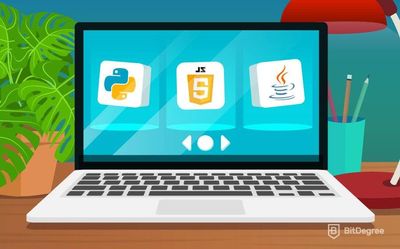Websites require a combination of different specialists, all dedicated to making a website feature-rich, stylish, modern, and to the point with the latest trends. People are frequently puzzled over two experts from this bunch: web designer vs. web developer. While they can contribute to the same web projects, their input is different.
Table of Contents
- 1. Web design vs. web development: different shoes to fill
- 2. Numbers reveal all: competitive salaries
- 3. What is web design: building the atmosphere of websites
- 4. What is web development?
- 4.1. Front-end developers
- 4.2. Back-end developers
- 4.3. Full-stack developers
- 5. Web designer vs. web developer: learning curves
- 6. The road to becoming a web designer
- 7. Decisions, decisions, decisions: web developers
- 8. Final notes on web designer vs. web developer
Web design vs. web development: different shoes to fill

Latest EXCLUSIVE 25% OFF Coupon Found:
EXCLUSIVE 25% OFF
On DataCamp Subscriptions
Follow the Datacamp promo code link & get an exclusive 25% OFF Datacamp subscriptions. Act now while the offer is still available!
- Web developers come from a highly-technical background: they either work on front-end, back-end, or full-stack development. They use programming languages to guarantee top-notch speed, functionality, and data security of websites. While front-end developers also play a pivotal role in the aesthetic appeal of websites, their work is powered by HTML, CSS, and JavaScript.
- Web designers might be skilled in coding with the same three languages, but this is not always the case. In fact, there is a false belief that these specialists never produce code. However, web designers control or partially contribute to CSS and HTML code in addition to being in charge of graphic elements. By nature, they are responsible for designing websites, figuring out color palettes that complement the page, selecting typography pairings, and choosing other visual elements of pages.
Even though people participate in heated discussions on web design vs. web development, I believe that both of these branches deserve respectable positions without the unnecessary comparisons. Of course, if you are interested in both, I will provide you some factors that are either going to be deal-breakers or the clinchers.
Numbers reveal all: competitive salaries

We will try to settle the argument over web designer vs. web developer: who is more in-demand in the workforce? Well, let’s take a look at some statistics regarding their salaries in the US. Web design vs. web development salaries: battle starts now.
- Web designers make approximately $36,533. However, earnings depend on the seniority of employees. For instance, top-level designers can make $73,017 per year. A starting level web designer is more likely to make about $28,273.
- Web development usually branches out into three fields. First of all, we have front-end developers that make around $50,795 per year. Once again, the salary depends on your expertise and level of experience, with top-level developers earning $105,627. A starting level front-end developer will make approximately $39,138 yearly.
- Back-end developers can make anywhere from $52,282 to $142,122 (depending on their experience), with the average yearly salary being $67,467.
- Last but not least, we have full-stack developers. Their yearly salary ranges from $56,209 to $131,229. The average would be $70,008.
After such numbers, you might be tempted towards a full-stack career. It is natural to want a higher salary, but you need to make sure that your choice coincides with your skill set. If you love producing visual elements and can immediately tell when a website is an eye-sore, maybe you should choose web design as your career path. However, if you feel like you can master front-end, back-end, or both, choose to become a web developer!
What is web design: building the atmosphere of websites
Web designers are technically-inclined people who have a variety of responsibilities, depending on their skill set and job description. In general, these are the most common tasks that web designers implement:
- Producing user experience designs such as user personas, site maps, etc.
- Building mockups of websites, showing the possible structure and designs of websites.
- Creating digital illustrations, logos, featured images, or other visual content with Adobe Photoshop or other software applications. Nowadays, vector graphics are becoming increasingly popular among websites.
- Considering the brand voice and designing visual imagery to empower it.
- Determining color combinations and palettes for websites and individual pages.
- Adding responsiveness to websites.
- Making various styling decisions related to typography to make sure that written content on websites is readable and inviting.
- Setting design guidelines, such as preferred colors, fonts, etc.
What is web development?

A web developer is responsible for taking a web designer’s concepts and incorporating them into fully functioning interactive websites. This usually involves a lot of coding, but some developers work with platforms like WordPress or Wix, requiring little to no coding skills. There are three different types of web developers who have slightly different roles.
Front-end developers
Front-end developers work hand-in-hand with web designers as they are the ones that add visual elements to websites. A general rule is that front-end specialists are responsible for the clear-cut structure of pages, incorporation of stylistic elements, responsiveness, and interactivity.
Comparing them to web designers is not fair-game as the majority of web designers are also front-end specialists, meaning that they create aesthetic elements, write code, and position visuals in all the right places. Therefore, the distinction between web designers and front-enders is pretty thin.
Back-end developers
While front-end developers and web designers have a lot in common, the discussion on web designer vs. web developer intensifies with back-end specialists. Server-side developers have more options: they can work with any programming language they want: Java, Python, PHP, Ruby on Rails, C, SQL, etc. They are usually responsible for things like membership portals, making eCommerce stores work, creating web apps, and building and maintaining databases.
The differences between web designers and web developers are evident in this case. Back-end specialists work under the hood, meaning that their work is all about functionality, not the looks. Unless, of course, we consider the quality of code: it can be just as beautiful as a masterpiece in a museum. On the other end, we have web designers that are focused on creating beautiful things.

- Easy to use with a learn-by-doing approach
- Offers quality content
- Gamified in-browser coding experience
- Free certificates of completion
- Focused on data science skills
- Flexible learning timetable

- High-quality courses
- Nanodegree programs
- Student Career services
- Nanodegree programs
- Suitable for enterprises
- Paid certificates of completion

- A wide range of learning programs
- University-level courses
- Easy to navigate
- University-level courses
- Suitable for enterprises
- Verified certificates of completion
Full-stack developers
Full-stack web developers usually have a strong working knowledge of both front and back-end development. This means that they understand a variety of different languages and programming concepts while being able to put them together to create a complete website on their own.
Full-stack developers usually work in one of two roles:
- As the supervisor/manager of a team of developers working together on a large project.
- On their own to create a complete website.
Web designer vs. web developer: learning curves

Credible web designers or web developers spent a lot of time building up a good reputation among their clients and companies. However, which position is easier to reach? It might depend on several factors:
- Your current skill set.
- Determination to reach your goal.
- Whether you find your calling or learn because of the potentially high salaries and comfortable living. Both of these professions require a spark, the mode of being captivated by the possibilities and learning options. After all, people involved in IT know that adapting to the latest solutions is one of the key factors when becoming a leading expert. When people say that the spark does not exist, they haven’t met a passionate web designer or developer.
Comparing the learning curves of web designers and developers is difficult. If you think that learning how to use Adobe Photoshop or Adobe Illustrator is enough, you have only touched the tip of the iceberg:
- Web designers have to comprehend how individual visual elements work with each other. In the simplest terms, you need to have a taste, a feeling for evaluating the effect of aesthetic components.
- Not everything is about natural impulses. You can also spend time learning about the effective strategies of web design. Start from reading about different forms, contrasts, sizes, spaces, and typography. All of these components will help you understand the way imagery or pages should look to attract attention for the right reasons.
- For web developers, the ‘gift’ is somewhat similar. It refers to the general abilities to understand the principles of programming, not just the functions or syntax rules. To be more specific, there even are different styles of programming that rookies might not even think about when getting started. For instance, object-oriented programming or OOP is one of the paradigms to explore.
The road to becoming a web designer

The learning paths for a web designer vs. web developer differ from the tools you need to the programming languages you must master.
- As I have mentioned, the best thing for wannabe web designers is to learn the main principles of creating unique graphic designs. In this course, the instructor starts from the little things: lines, shapes, forms, spaces, tones, colors, typography, etc. While you might be eager to jump into an actual editor, you should delay this until you have gathered enough information on the theoretical level.
- Furthermore, we recommend starting your first web design project. In this course, you will review such concepts as wireframes, responsive designs, and prototyping. There is even a lecture about communicating with your client: the tips for effective interactions that lead to project completion faster.
- Depending on your job description, you might need to produce various graphic designs. I am going to provide you with several options to enhance your resume and skillset. For instance, you can improve your calligraphy skills, master Adobe Photoshop and dip your toe in the vector art designing.
- Some web designers also take the role of front-end developers, especially in small-scale projects. Therefore, it is useful to learn about HTML, CSS, and JavaScript.
- If you are currently living on a tight budget, you might consider applying for a scholarship to cover course expenses and give you some rewards after successful learning.
Decisions, decisions, decisions: web developers
If you choose to be a front-end developer, your learning path will be quite clear: HTML, CSS, JavaScript, and some additional frameworks. However, back-end development often depends on people’s preferences. There are many programming languages that can be used for server-side: PHP, Python, Ruby on Rails, C, SQL, etc.
To get started, start this bootcamp to cover the majority of the concepts about web development, including HTML, CSS, JavaScript, jQuery, Bootstrap, Node.js, MySQL, and more! If you feel like Python is the choice for your back-end journey, try this course. However, you can go with a more traditional choice: PHP for web development. It is all up to you!
Final notes on web designer vs. web developer
What is web development? It is all about producing gorgeous, responsive, interactive, and engaging websites. Both web designers and web developers are contributors of such projects. However, you should not confuse their roles. Let’s take a look at the main points of this article:
- What is web design? Web designers are in charge of creating mockups, figuring out color schemes, creating visual graphics, etc. They might create such elements and transfer them to front-end specialists. In other cases, web designers are also front-end experts, and they place their visual graphics on websites without assistance.
- Front-end developers are close relatives of web designers. They both work with HTML, CSS, and JavaScript. However, back-end developers work with languages such as Python, PHP, or SQL.
Remember, becoming a web developer or a web designer isn’t something that you can do overnight. Put together a comprehensive study plan. Decide precisely what skills you need to learn, and make sure that you remain committed to learning. Above all, have fun with whatever path you choose!












